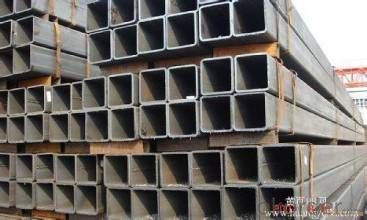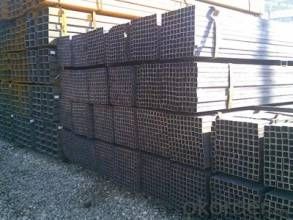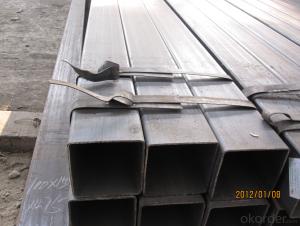Rectangular Hot Rolled Steel Pipe
- Loading Port:
- China Main Port
- Payment Terms:
- TT or LC
- Min Order Qty:
- -
- Supply Capability:
- -
OKorder Service Pledge
OKorder Financial Service
You Might Also Like
Quick Details
| Thickness: | 1.0 - 35 mm | Section Shape: | Square | Outer Diameter: | 20*20-600*600 |
| Place of Origin: | Shandong China (Mainland) | Secondary Or Not: | Non-secondary | Application: | Structure Pipe |
| Technique: | Cold Rolled | Certification: | CE | Surface Treatment: | oil,paint |
| Special Pipe: | Thick Wall Pipe | Alloy Or Not: | Non-alloy | Name: | Square Hollow Steel Pipe/Tube |
| Shape: | Square/Rectangular | Yield Strength: | 360-380Mpa | Tensile Strength: | 560-580Mpa |
| Elongation: | 24-28% | Bend Test: | Qualified | Impact Value: | V-notch |
| Grade: | 20#,45#,16Mn,A210,St45,Q235,Q345,Q195,Q215,10#-45#,A53-A369,ST35-ST52,Q195-Q345 | Standard: | JIS G3465-2006,JIS G3466,GB/T 3094 |
Specifications
1.OD:15X15-800X800MM,20X30--600X800MM
2.Thick.:1.0--35.0MM
FAQ of Hollow Section
①How is the quality of your products?
Our products are manufactured strictly according to national and internaional standard, and we take a test
on every pipe before delivered out. If you want see our quality certifications and all kinds of testing report, please just ask us for it.
Guaranteed: If products’ quality don’t accord to discription as we give or the promise before you place order, we promise 100% refund.
②How about price?
Yes, we are factory and be able to give you lowest price below market one, and we have a policy that “ for saving time and absolutely honest business attitude, we quote as lowest as possible for any customer, and discount can be given according to quantity”,if you like bargain and factory price is not low enough as you think, just don’t waste your time.Please trust the quotation we would give you, it is professional one.
③Why should you chose us?
Chose happens because of quality, then price, We can give you both.Additionally, we can also offer professional products inquiry, products knowledge train(for agents), smooth goods delivery, exellent customer solution proposals.Our service formula: good quality+good price+good service=customer’s trust
SGS test is available, customer inspection before shipping is welcome, third party inspection is no problem.
Rectangular Pipe Image


- Q:What are the different methods of joining steel pipes?
- There are several different methods of joining steel pipes, including welding, threading, flanging, grooving, and using mechanical connectors.
- Q:How do you calculate the pipe thermal expansion coefficient for steel pipes?
- In order to calculate the pipe thermal expansion coefficient for steel pipes, it is necessary to take into account both the linear expansion coefficient of the material and the temperature change. The typical linear expansion coefficient for steel is approximately 12 x 10^-6 per degree Celsius. To begin with, establish the initial length of the pipe, which is represented by L0. Then, measure the temperature change, indicated as ΔT. Proceed by multiplying the initial length of the pipe by the linear expansion coefficient and the temperature change: ΔL = L0 * α * ΔT. The resulting value, ΔL, signifies the alteration in length of the steel pipe caused by thermal expansion.
- Q:What are the safety precautions when working with steel pipes?
- When working with steel pipes, some important safety precautions to follow include wearing appropriate personal protective equipment (PPE) such as gloves, safety glasses, and steel-toed boots to protect against potential injuries. Additionally, it is essential to ensure proper ventilation in the work area to prevent the accumulation of hazardous fumes or gases. Using the correct tools and equipment, such as pipe wrenches and clamps, and following proper lifting techniques are crucial to avoid strains or back injuries. Regular inspection and maintenance of the pipes and equipment are also necessary to prevent any potential accidents. Lastly, it is important to receive proper training and follow established safety procedures to minimize risks and promote a safe working environment.
- Q:How are steel pipes protected against lightning strikes?
- Steel pipes are protected against lightning strikes by installing lightning rods or grounding systems near the pipes. These systems provide a path of least resistance for lightning to follow, diverting the electrical current away from the pipes and minimizing the risk of damage or explosions.
- Q:How are steel pipes connected to other plumbing components?
- Steel pipes are typically connected to other plumbing components through various methods such as threaded connections, welding, or using compression fittings.
- Q:How are steel pipes used in the manufacturing of food processing machinery and equipment?
- Due to their numerous advantageous properties, steel pipes are essential in the manufacturing of food processing machinery and equipment. They are widely used in the food industry for their durability, ability to withstand high temperatures and pressures, and resistance to corrosion. The primary use of steel pipes in food processing machinery is for transporting fluids and gases. These pipes are responsible for carrying water, steam, liquids, air, and gases throughout the processing plant. By utilizing steel pipes, the food industry can ensure the reliable and hygienic transfer of these substances, maintaining the quality and safety of food products. Steel pipes also play a crucial role in the design and construction of food processing equipment such as mixers, blenders, conveyors, and canning machines. These machines require pipes to facilitate the movement of ingredients, processing fluids, and cleaning agents. Steel pipes, with their high strength, can handle the heavy loads and pressures associated with food processing operations, making them an ideal choice for such applications. Another significant benefit of steel pipes in food processing machinery is their resistance to corrosion. With the use of various acidic and alkaline substances, as well as hot water and steam, corrosion can occur in other materials. However, steel pipes, especially those made from stainless steel, exhibit a high resistance to corrosion. This ensures that the machinery remains in optimal condition, prolonging its lifespan. Furthermore, the smooth internal surface of steel pipes allows for efficient and hygienic cleaning. This minimizes the accumulation of food particles and contaminants, which is crucial in the food industry. By maintaining high levels of cleanliness, the growth of bacteria can be prevented, ensuring food safety. In conclusion, steel pipes are indispensable in the manufacturing of food processing machinery and equipment. Their durability, resistance to corrosion, ability to handle high temperatures and pressures, and hygienic characteristics make them the ideal choice for transporting fluids and gases, as well as constructing various food processing equipment.
- Q:Can steel pipes be used for underground stormwater systems?
- Yes, steel pipes can be used for underground stormwater systems. Steel pipes are durable and resistant to corrosion, making them a suitable choice for underground applications. Additionally, steel pipes can handle high volumes of stormwater, making them ideal for stormwater management systems.
- Q:How are steel pipes used in the power generation industry?
- Steel pipes are widely used in the power generation industry for various purposes such as transporting fluids, gases, and steam, as well as for structural support and heat exchange. They are used in power plants for conveying cooling water, fuel, and exhaust gases, as well as in boiler systems for transporting high-pressure steam. Additionally, steel pipes are utilized for constructing heat exchangers, condensers, and other critical components, ensuring the efficient and reliable operation of power generation facilities.
- Q:What are the common sizes of steel pipe fittings?
- The common sizes of steel pipe fittings range from 1/8 inch to 24 inches in diameter.
- Q:What are the safety regulations for working with steel pipes?
- The safety regulations for working with steel pipes typically include wearing appropriate personal protective equipment (PPE), such as gloves, safety glasses, and steel-toed boots, to prevent injuries. Workers should also receive training on proper handling and lifting techniques to avoid strains and sprains. Additionally, the use of proper tools and equipment, such as pipe cutters and clamps, is essential for safe operations. It is important to follow procedures for securing pipes to prevent them from rolling or falling. Finally, workers should be aware of potential hazards, such as sharp edges and hot surfaces, and practice good housekeeping to minimize slips, trips, and falls.
1. Manufacturer Overview |
|
|---|---|
| Location | |
| Year Established | |
| Annual Output Value | |
| Main Markets | |
| Company Certifications | |
2. Manufacturer Certificates |
|
|---|---|
| a) Certification Name | |
| Range | |
| Reference | |
| Validity Period | |
3. Manufacturer Capability |
|
|---|---|
| a)Trade Capacity | |
| Nearest Port | |
| Export Percentage | |
| No.of Employees in Trade Department | |
| Language Spoken: | |
| b)Factory Information | |
| Factory Size: | |
| No. of Production Lines | |
| Contract Manufacturing | |
| Product Price Range | |
Send your message to us
Rectangular Hot Rolled Steel Pipe
- Loading Port:
- China Main Port
- Payment Terms:
- TT or LC
- Min Order Qty:
- -
- Supply Capability:
- -
OKorder Service Pledge
OKorder Financial Service
Similar products
New products
Hot products
Hot Searches
Related keywords






























